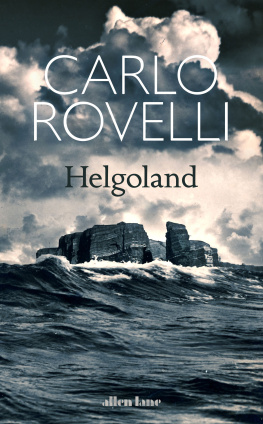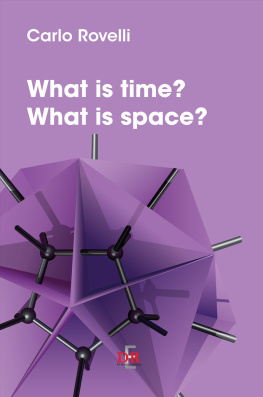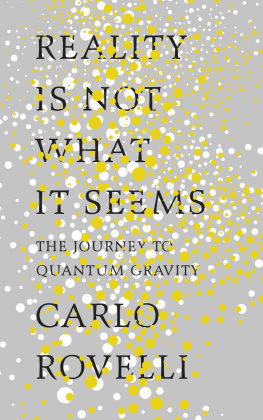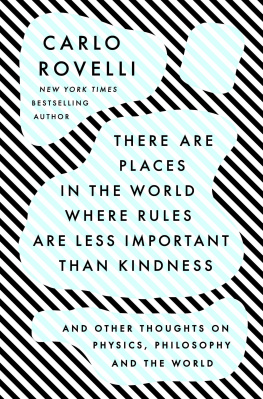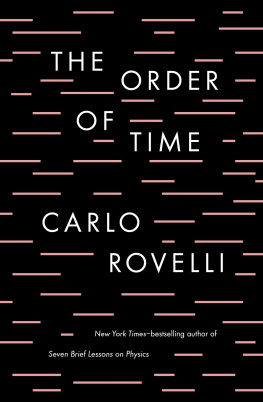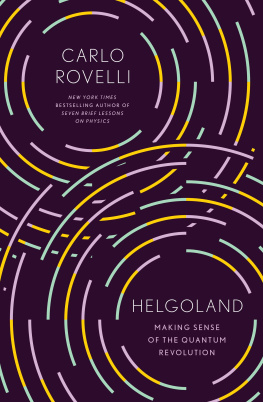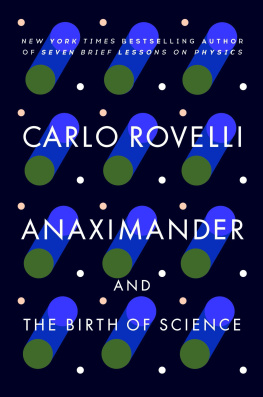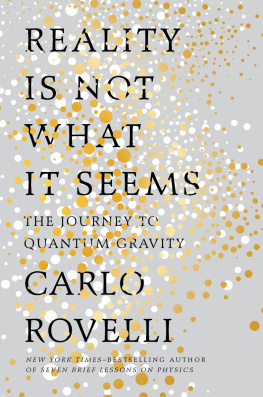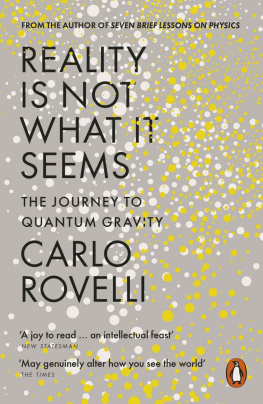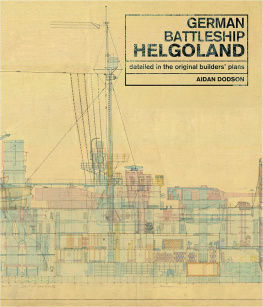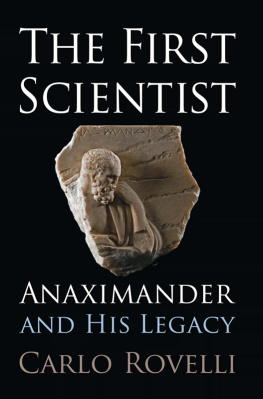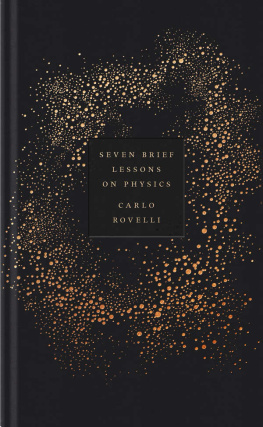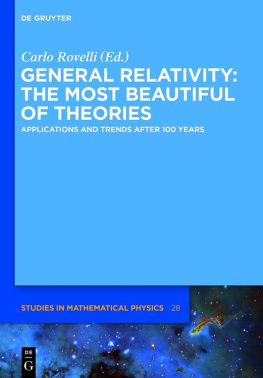Carlo Rovelli - Helgoland
Here you can read online Carlo Rovelli - Helgoland full text of the book (entire story) in english for free. Download pdf and epub, get meaning, cover and reviews about this ebook. year: 2021, genre: Romance novel. Description of the work, (preface) as well as reviews are available. Best literature library LitArk.com created for fans of good reading and offers a wide selection of genres:
Romance novel
Science fiction
Adventure
Detective
Science
History
Home and family
Prose
Art
Politics
Computer
Non-fiction
Religion
Business
Children
Humor
Choose a favorite category and find really read worthwhile books. Enjoy immersion in the world of imagination, feel the emotions of the characters or learn something new for yourself, make an fascinating discovery.
- Book:Helgoland
- Author:
- Genre:
- Year:2021
- Rating:3 / 5
- Favourites:Add to favourites
- Your mark:
- 60
- 1
- 2
- 3
- 4
- 5
Helgoland: summary, description and annotation
We offer to read an annotation, description, summary or preface (depends on what the author of the book "Helgoland" wrote himself). If you haven't found the necessary information about the book — write in the comments, we will try to find it.
Helgoland — read online for free the complete book (whole text) full work
Below is the text of the book, divided by pages. System saving the place of the last page read, allows you to conveniently read the book "Helgoland" online for free, without having to search again every time where you left off. Put a bookmark, and you can go to the page where you finished reading at any time.
Font size:
Interval:
Bookmark:
Erica Segre and Simon Carnell

PENGUIN BOOKS
UK | USA | Canada | Ireland | Australia
New Zealand | India | South Africa
Penguin Books is part of the Penguin Random House group of companies whose addresses can be found at global.penguinrandomhouse.com.

First published in Italian by Adelphi Edizioni SpA, 2020
This translation first published 2021
Copyright Adelphi Edizioni SpA, 2020
Translation copyright Erica Segre and Simon Carnell, 2021
Diagram images copyright Shutterstock.com
The moral right of the author and of the translators has been asserted
Cover photograph Franz Schensky
Courtesy of the Museum Helgoland
Photograph akg-images
Cover design by Jim Stoddart
ISBN: 978-0-241-45470-1
This ebook is copyright material and must not be copied, reproduced, transferred, distributed, leased, licensed or publicly performed or used in any way except as specifically permitted in writing by the publishers, as allowed under the terms and conditions under which it was purchased or as strictly permitted by applicable copyright law. Any unauthorized distribution or use of this text may be a direct infringement of the authors and publishers rights and those responsible may be liable in law accordingly.
To Ted Newman, who made me understand that I did not understand quantum theory
aslav and I are sitting on the sand a few steps from the shore. We have been talking intensely for hours. We came to the island of Lamma, across from Hong Kong, during the afternoon break of a conference. aslav is a world-renowned expert on quantum mechanics. At the conference, he presented an analysis of a complex thought experiment. We discussed and re-discussed the experiment on the path through the coastal jungle leading to the shore, and then here, by the sea. We have ended up basically agreeing. On the beach there is a long silence. We watch the sea. Its really incredible, aslav whispers. Can we believe this? Its as if reality didnt exist
This is the stage we are at with quanta. After a century of resounding triumphs, having gifted us contemporary technology and the very basis for twentieth-century physics, the theory that is one of the greatest ever achievements of science fills us with astonishment, confusion and disbelief.
There was a moment when the grammar of the world seemed clear: at the root of the variegated forms of reality, just particles of matter guided by a few forces. Humankind could think that it had raised the Veil of Maya, seen the basis of the real. It didnt last. Many facts did not fit. Until, in the summer of 1925, a twenty-three-year-old German spent days of anxious solitude on a windswept island in the North Sea: Helgoland in English also Heligoland the Sacred Island. There, on the island, he found the idea that made it possible to account for all recalcitrant facts, to build the mathematical structure of quantum mechanics, quantum theory. Perhaps the most impressive scientific revolution of all time. The name of the young man was Werner Heisenberg, and the story told in this book begins with him.
Quantum theory has clarified the foundations of chemistry, the functioning of atoms, of solids, of plasmas, of the colour of the sky, the dynamics of the stars, the origins of galaxies a thousand aspects of the world. It forms the basis of our latest technologies: from computers to nuclear power. Engineers, astrophysicists, cosmologists, chemists and biologists all use it daily; the rudiments of the theory are included in high-school curricula. It has never been wrong. It is the beating heart of todays science. Yet it remains profoundly mysterious, subtly disturbing.
It has destroyed the image of reality as made up of particles that move along defined trajectories without, however, clarifying how we should think of the world instead. Its mathematics does not describe reality. Distant objects seem magically connected. Matter is replaced by ghostly waves of probability.
Whoever stops to ask themselves what quantum theory has to say about the actual world remains perplexed. Einstein, even though he had anticipated ideas that put Heisenberg on the right track, could never digest it himself. Richard Feynman, the great theoretical physicist of the second half of the twentieth century, wrote that nobody understands quanta.
But this is what science is all about: exploring new ways of conceptualizing the world. At times, radically new. It is the capacity to constantly call our concepts into question. The visionary force of a rebellious, critical spirit, capable of modifying its own conceptual basis, capable of redesigning our world from scratch.
If the strangeness of quantum theory confuses us, it also opens new perspectives with which to understand reality. A reality that is more subtle than the simplistic materialism of particles in space. A reality made up of relations rather than objects.
The theory suggests new directions in which to rethink great questions, from the structure of reality to the nature of experience, from metaphysics to perhaps even the very nature of consciousness. Today this is all a matter of the liveliest debate among scientists and among philosophers. I speak about it all in the following pages.
On the island of Helgoland barren, extreme, battered by the winds of the North Werner Heisenberg lifted a veil. An abyss opened. The story that this book has to tell starts from the island where Heisenberg conceived the germ of his idea, and progressively widens to take in ever bigger questions opened by the discovery of the quantum structure of reality.

I have written this book primarily for those who are unfamiliar with quantum physics and are interested in trying to understand, as far as any of us can, what it is and what it implies. I have sought to be as concise as possible, omitting every detail that is not essential to grasping the heart of the issue. I have tried to be as clear as possible, about a theory that is at the centre of the obscurity of science. Perhaps rather than explaining how to understand quantum mechanics, I explain why it is so difficult to understand.
But I have also written it thinking of my colleagues scientists and philosophers who, the more they delve into the theory, the more they are perplexed to continue the ongoing conversation on the significance of this astonishing physics. The book has notes intended for those who are familiar with quantum mechanics. They add a bit of precision to what I try to say in a more readable form in the text.
The objective of my research in theoretical physics has been to understand the quantum nature of space and time: to make quantum theory cohere with Einsteins discoveries. For this, I have found myself thinking continually about quanta. This book represents where I have got to so far. It does not ignore other opinions, but it is shamelessly partisan: centred on the perspective that I consider the most effective and I think opens up the most interesting paths: the relational interpretation of quantum theory.
A warning before we begin. The abyss of what we do not know is always magnetic and vertiginous. But to take quantum mechanics seriously, reflecting on its implications, is an almost psychedelic experience: it asks us to renounce, in one way or another, something that we cherished as solid and untouchable in our understanding of the world. We are asked to accept that reality may be profoundly other than we had imagined: to look into the abyss, without fear of sinking into the unfathomable.
Font size:
Interval:
Bookmark:
Similar books «Helgoland»
Look at similar books to Helgoland. We have selected literature similar in name and meaning in the hope of providing readers with more options to find new, interesting, not yet read works.
Discussion, reviews of the book Helgoland and just readers' own opinions. Leave your comments, write what you think about the work, its meaning or the main characters. Specify what exactly you liked and what you didn't like, and why you think so.

